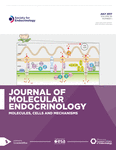Serum estradiol levels in controlled ovarian stimulation directly affect the endometrium
- Kamran Ullah,
- Tanzil Ur Rahman ,
- Hai- Tao Pan,
- Meng- Xi Guo,
- Xin- Yan Dong,
- Juan Liu,
- Lu- Yang Jin ,
- Yi Cheng ,
- Zhang- Hong Ke,
- Jun Ren,
- Xian-hua Lin,
- Xiao- Xiao Qiu ,
- Ting- Ting Wang,
- He-Feng Huang and
- Jian-zhong Sheng⇑
- K Ullah, Pathology and Pathophysiology, Zhejiang University, Hangzhou, China
- T Rahman , Pathology and Pathophysiology, Zhejiang University, Hangzhou, China
- H Pan, Pathology and Pathophysiology, Shaoxing Women and Children's Hospital, Shaoxing, China
- M Guo, Pathology and Pathophysiology, Zhejiang University, Hangzhou, China
- X Dong, Pathology and Pathophysiology, Zhejiang University, Hangzhou, China
- J Liu, Pathology and Pathophysiology, Zhejiang University, Hangzhou, China
- L Jin , Pathology and Pathophysiology, Zhejiang University, Hangzhou, China
- Y Cheng , Pathology and Pathophysiology, Zhejiang University, Hangzhou, China
- Z Ke, Pathology and Pathophysiology, Zhejiang University, Hangzhou, China
- J Ren, Pathology and Pathophysiology, Zhejiang University, Hangzhou, China
- X Lin, Department of Reproductive Medical Center, The International Peace Maternity and Child Health Hospital, School of Medicine, Shanghai Jiao Tong University, Shanghai, China
- X Qiu , Pathology and Pathophysiology, Zhejiang University, Hangzhou, China
- T Wang, Pathology and Pathophysiology, Zhejiang University, Hangzhou, China
- H Huang, Endocrinology, International Peace Maternity and Child Health Hospital School of Medicine Shanghai Jiao Tong University, Shanghai, China
- J Sheng, The Key Laboratory of Reproductive Genetics, Ministry of Education, Zhejiang University, Hangzhou, 310058, China
- Correspondence: Jian-zhong Sheng, Email: shengjz{at}zju.edu.cn
Abstract
Previous studies have shown that increasing concentrations of estradiol had a toxic effect on the embryo and were deleterious to embryo adhesion. In this study, we evaluated the physiological impact of estradiol levels on endometrial cells to unveil that serum estradiol levels probably targeted endometrium in controlled ovarian hyperstimulation (COH) protocols. An attachment model of human choriocarcinoma (JAr) cell spheroids to receptive-phase endometrial epithelial cells and Ishikawa cells treated with different estradiol (10-9M or 10-7M) levels was developed. Differentially expressed protein profiling of the Ishikawa cells was performed by proteomic analysis. Estradiol at 10-7M demonstrated a high attachment rate of JAr spheroids to the endometrial cell monolayers. Using iTRAQ coupled with LC-MS/MS, we identified 45 differentially expressed proteins containing 43 significantly up-regulated and 2 down-regulated proteins in Ishikawa cells treated with 10-7M estradiol. Differential expression of C3, plasminogen and kininogen-1 by western blot confirmed the proteomic results. C3, plasminogen and kininogen-1 localization in human receptive endometrial luminal epithelium highlighted the key proteins as possible targets for endometrial receptivity and interception. Ingenuity pathway analysis of differentially expressed proteins exhibited a variety of signaling pathways, including LXR/RXR activation pathway and acute phase response signaling, and, upstream regulators (TNF, IL6, Hmgn3, and miR-140-3p) associated with endometrial receptivity. The observed estrogenic effect on differential proteome dynamics in Ishikawa cells indicates that the human endometrium is the probable target for serum estradiol levels in COH cycles. The findings are also important for future functional studies with the identified proteins that may influence embryo implantation.
- Received 17 February 2017
- Revision received 21 May 2017
- Accepted 24 May 2017
- Accepted Preprint first posted online on 24 May 2017











